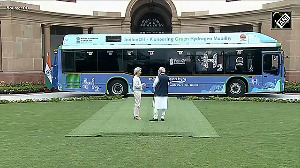 India Inc's busy bees should stop treating back-to-back meetings as some kind of a macho badge of honour, notes Shyamal Majumdar
India Inc's busy bees should stop treating back-to-back meetings as some kind of a macho badge of honour, notes Shyamal Majumdar
Call any corporate executive you know and the common response from his/her office would be that there isn’t a slot available in the meeting diary for at least three weeks.
A middle-level executive complained the other day that she was 'slammed' with meetings that droned on about mundane details of business and in most of them she was not really needed.
It’s not that meetings aren’t required -- a lot can actually happen when people sit together to discuss important issues and come up with solutions.
But the problem starts when India Inc’s busy bees treat back-to-back meetings as some kind of a macho badge of honour.
Sample this.
In a large media organisation, the boss decides whom to call for his daily meetings just five minutes before they start.
As a result, the hopefuls keep checking the phone to figure out whether they are in or out of that day’s meeting.
This means instead of focusing on what to discuss, the employees look at these meetings as a barometer of whether they are still in the boss’ charmed circle or out of it.
The story doesn’t end there -- a new entrant to the meeting says he was quick to figure out what to answer when the boss asked whether they were aware of the significance of a particular development of the day.
Those who say ‘yes’ usually invite trouble as the boss is actually expecting a ‘no’ for an answer so that he can hold forth on the subject for the next 15 minutes.
After the ‘meeting’ is over, the actual work begins when the senior employees sit together to discuss the day’s agenda, which largely involves second-guessing the boss.
Then there are bosses who confuse meetings of smaller groups with a town hall address where the audience is large and there is hardly any scope for discussions or counter-questions.
So the boss delves into a long lecture while others either watch the ceiling or the clock.
There’s more.
Studies have shown very few read the background or proposal papers (which are usually very long) circulated much in advance before a meeting.
In one company, the chairman spends just a couple of minutes before each meeting going through all the papers he had not read with a thick red pen, marking lines and question marks in the margins at random, and making sure these are accidentally made visible to other participants while the subject is being discussed.
Also, many regular meeting-goers say the main fault of the agenda papers is they are too vague.
For example, “Determine the product launch date” is so much better than just “Product launch” and “Need to increase the promotion budget” says a lot more than just “Promotion budget”.
The former clearly helps everybody be more focused.
Another big complaint about meetings is that they start late, end late, and waste time in between. An organisation’s meeting culture can change radically simply by starting and ending on time.
If meetings go on for far too long (say, a 30-minute meeting even if you really need 10 minutes to make a decision), people start whispering to each other holding side-meetings, which potentially sidetracks the original purpose.
Decide in advance how long a meeting should last solely on the basis of what you need to accomplish -- and nothing more.
And tell everyone the meeting will end on time no matter what.
Then there are ‘meeting hijackers’, who try to grab the stage and steer the agenda in their own direction.
That is when the chairman of a meeting has to step in to bring the discussions back on track.
Also, beware long-winded colleagues who can’t for the life of them summarise their points and take a long time to say very little. Here too, it’s the boss’ job to indicate to them the need for brevity.
Though no estimates for India Inc is available, a Microsoft survey said employees globally spend an average of 5.6 hours a week in meetings and a whopping 69 per cent of participants feel these are unproductive.
These weekly 5.6 hours of unproductive time are like giving each employee 12 additional days of paid vacation per year.
That’s something to chew over.
The image is used for representational purpose only







 © 2025
© 2025